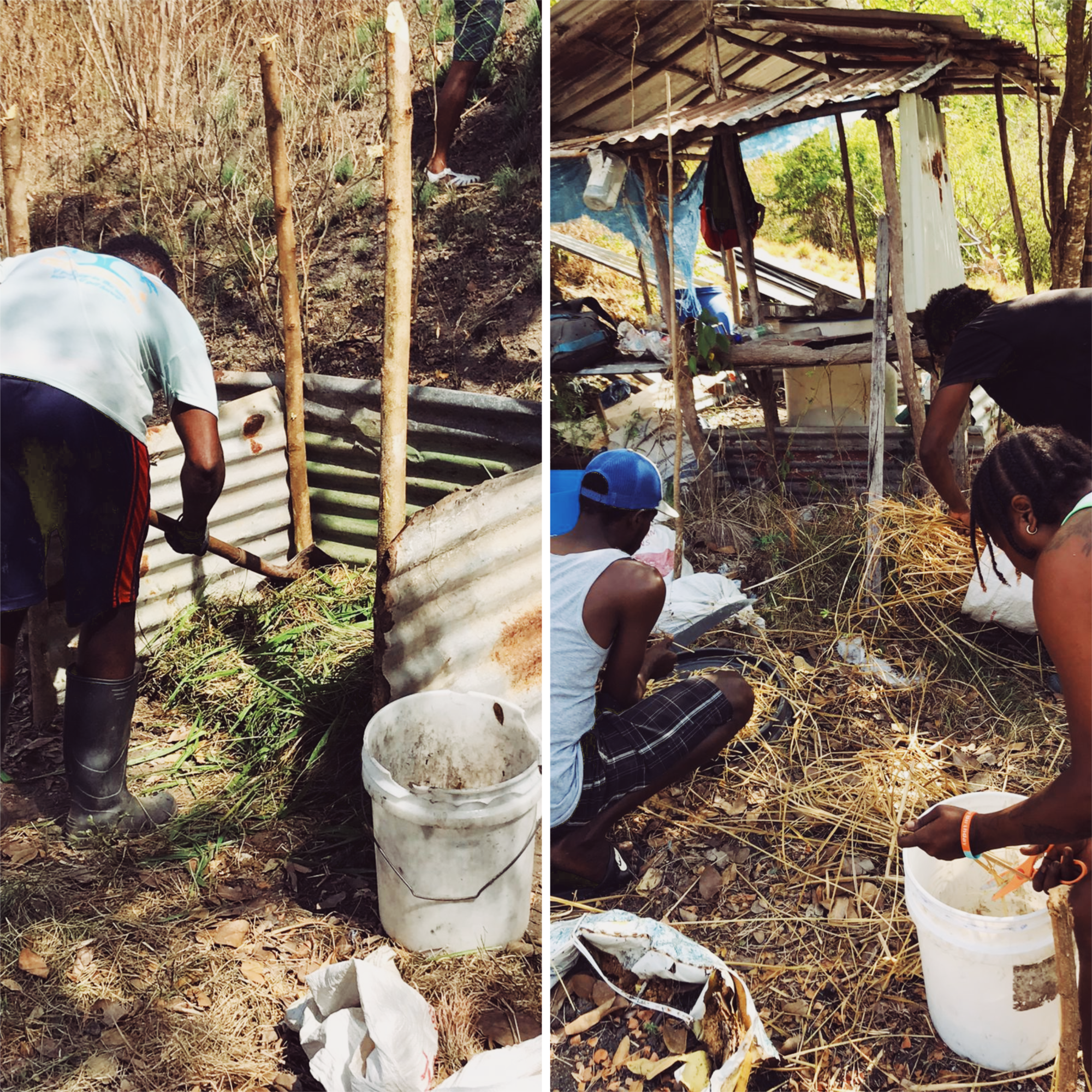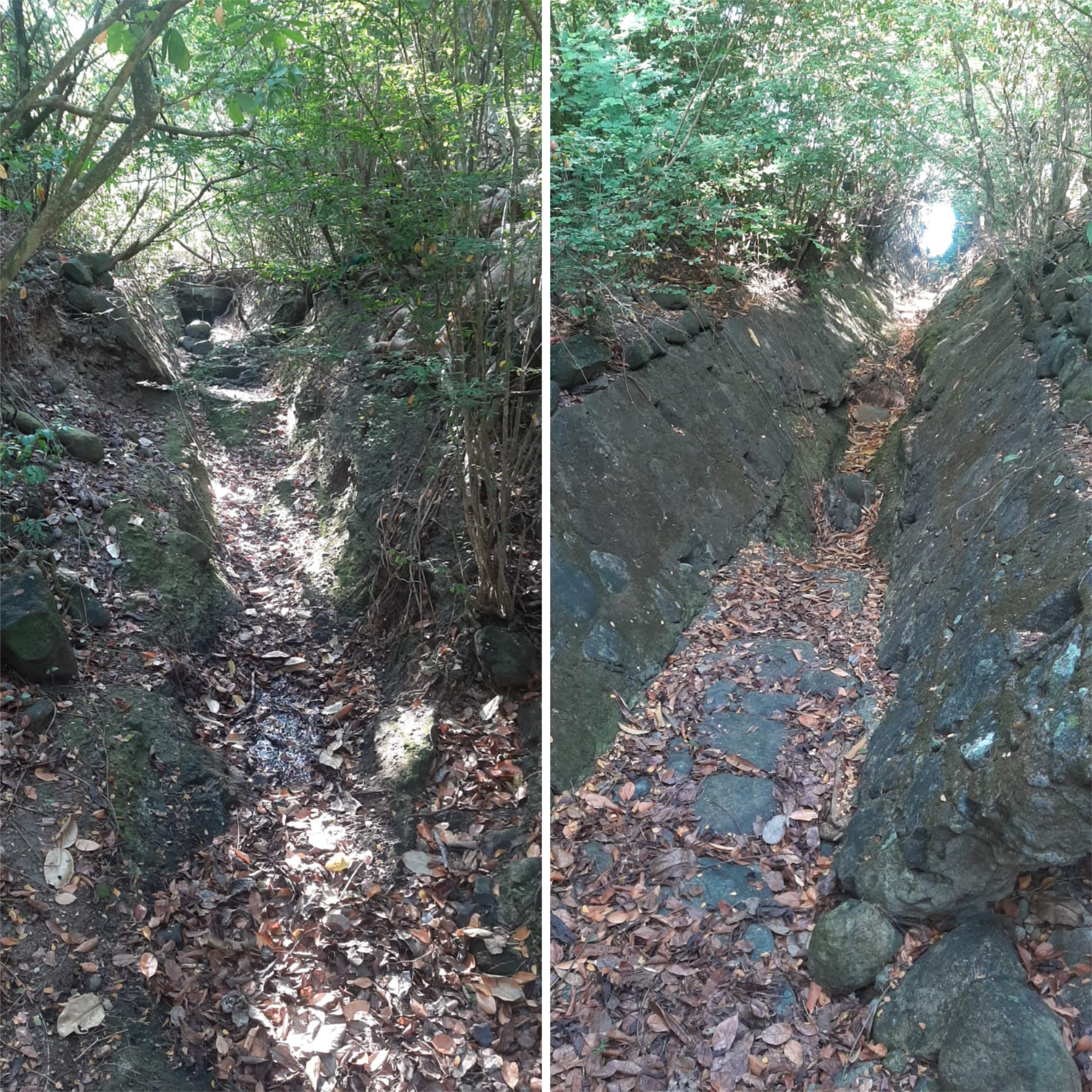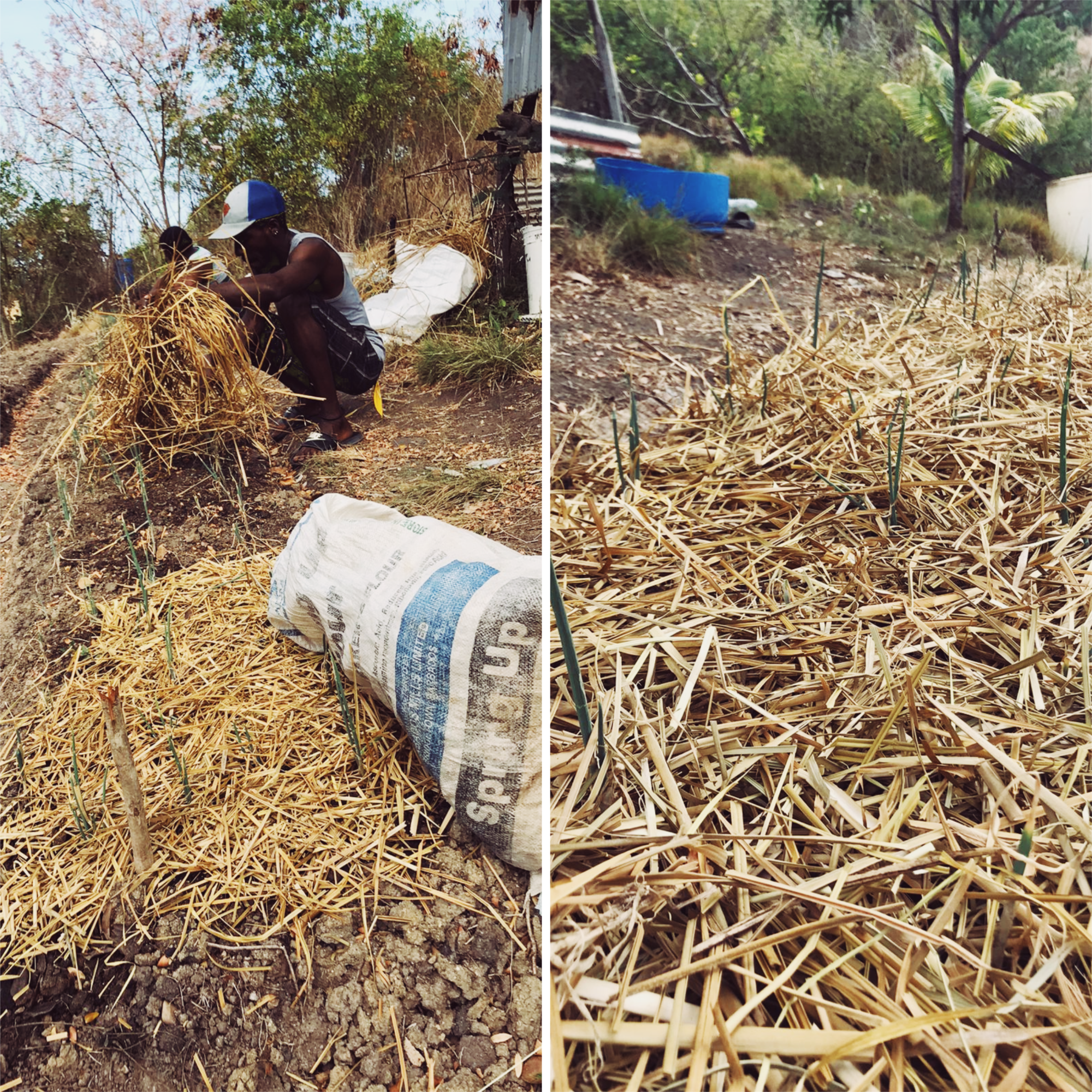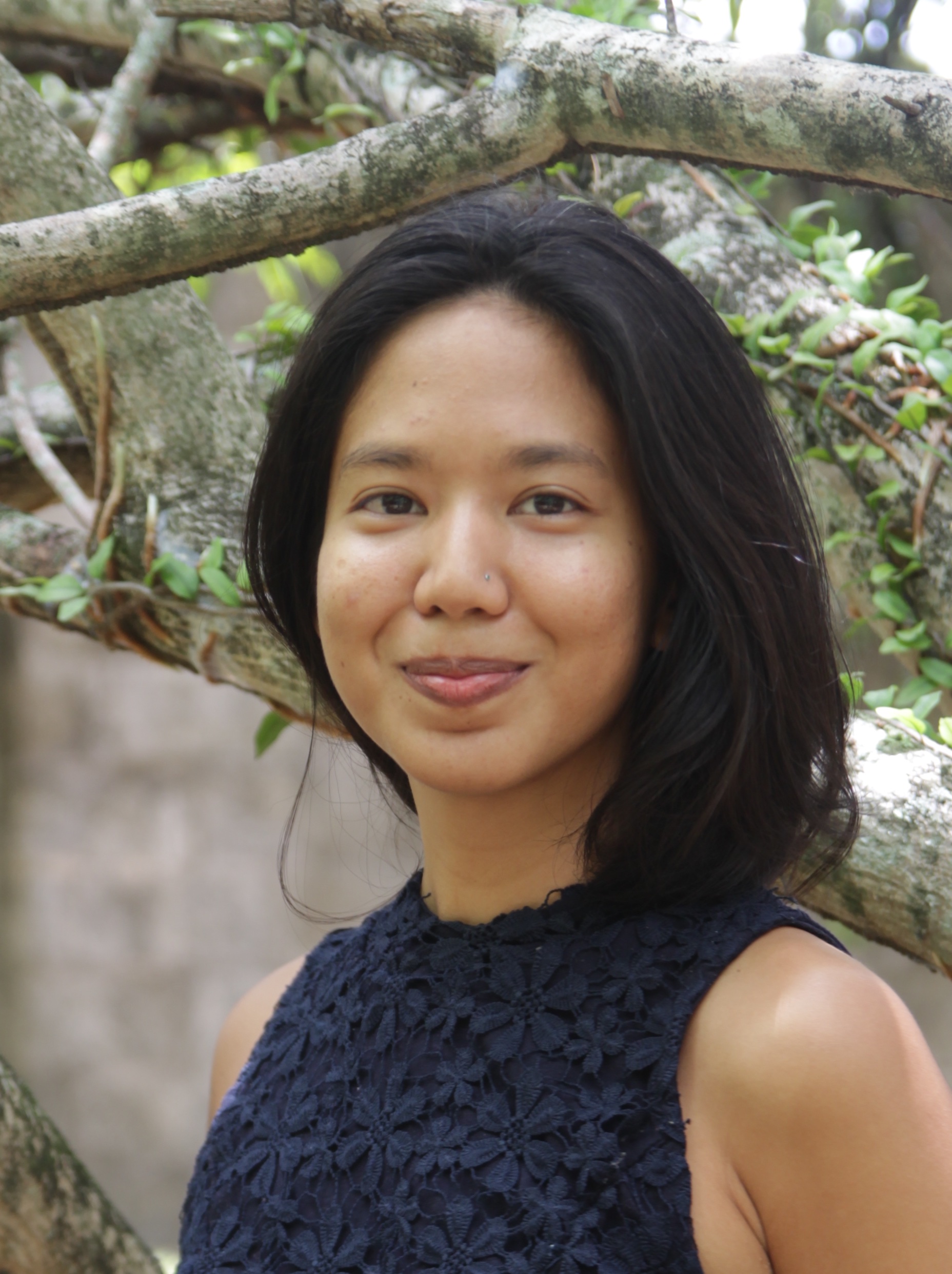
Kenroy Charles and friends prepare beds for planting chives on their farm in Canaries, Saint Lucia (SLU) (Photo: Kenroy Charles, 2023)
“To me, climate change is the changing of the weather pattern,” offers Kenroy Charles, the IICA-CBF EbA project’s youth farmer in focus. Kenroy is one of two farmers from Saint Lucia who participated in and benefitted from the project’s Farmers’ Caucus. Presently in his mid-twenties, Kenroy Charles has been farming for over half his young life, in his community of Canaries. There, his passion for farming was seeded by seeing members of his community planting crops and rearing animals. “That’s one of the main sources of income in my community,” he explains. Kenroy and two friends, Glen St. John and Cherika Toussaint, have taken up the mantle of carrying this farming legacy forward on a 5-acre plot, growing castor, chives, tomatoes, sweet potatoes, watermelon, cantaloupe and passionfruit.
“We used to have the dry season and the rainy season,” recalls Kenroy, “but now things have changed where you find a lot of rain in the dry season, and sometimes we experience sunny, very hot weather, or high temperatures in the rainy season. You get more, and stronger storms, more flooding.” On continuing to farm in these conditions, Kenroy reflects, “With training and equipment, it is possible.” He emphasises the necessity of being well informed and prepared, a takeaway cemented through participating in the Climate Smart Agriculture training under the EbA Project: “It’s all about planning and having different types of seeds, for example, drought-tolerant seeds, having raised beds, drip systems. It’s basically about preparation for the seasons.” The training, he says, “has been a game-changer…Before the training, I got some knowledge from other farmers on different practices. But, in the training, he (IICA’s Dr. Chaney St. Martin) went more in depth, for example, how to make the compost, and how to prepare the compost heap.”

Left: Turning the compost pile; Right: preparing vetiver grass for use as mulch (Photos: IICA SLU, March 2023)
The workshops provided a different lens through which Kenroy now views his farm. He has since shifted his approach to farming: “In the past, I would identify an area, clear it and then plant. But now, I have to take into consideration that you need to prepare for any pests, have a backup plan for if any pests might damage the crop.” Kenroy says that he learned to better diagnose and find solutions, “examining the different areas, trying to find out what pests can be found in that area by just looking at the types of vegetation that is growing on that plot of land. With the weeds you can tell if that area is very water-logged, what kind of pests you can find in that area, the types of nutrients that you can find in that area, for example.” Among other concerns he faces as a farmer are praedial larceny, market factors, i.e., “...when that crop is in demand, the price you will be selling that crop, and when the other farmers will be planting that crop to avoid competing,” and climate.
In response to climate change, and armed with the skills acquired in the workshop, Kenroy is shifting towards farming climate-smart. One of his focal points will be on water, “storing, harvesting water for the drought season, using different equipment, for example ploughing and tilling equipment.” He describes one of his climate-related challenges, and solutions: “In the rainy season, you tend to find some areas that are very water-logged, so therefore you need to plough the land to ensure that the excess water can drain.” He explains that he also has backup plans in light of severe storms, planting two main crops to increase their likelihood for financial profit despite potential crop failure. Another major challenge has been consistent access to water for irrigating the crops. “The area that we’re farming on, doesn’t have any water source,” Kenroy relates, “We have a ravine, but in the dry season, it tends to be dry, so therefore, we need some kind of storage to ensure that we have water throughout the dry season. That’s one of the challenges we have been facing throughout the years. Because the tanks are very expensive.” With a small grant Kenroy received from the project, they have purchased a water pump, drip lines and 1000g tank, to enhance the farm’s water storage capacity.

The ravine on the farm (Photo: IICA SLU, March 2023)
Despite any challenges, Kenroy says that the most satisfying part of his vocation is planting using very little agro-chemicals as possible, so that they can feel safe to sell and also consume their produce themselves. “Agriculture is the backbone of a nation,” he proffers, while also lamenting what he believes to be limited support from his country’s government for the sector. He shares, “We have some young farmers island-wide who are interested (in farming), but they don’t get the support in terms of equipment, marketing, finance, training, exporting, and some other areas…I believe our government should put things in place, to help strengthen the agriculture sector and the farmers in my country.”
In the meantime, Kenroy continues to take action on what he has been learning, including integrating nature-based solutions on the farm. He’s happy to say that his compost decomposes faster with the new composting techniques he was taught. Kenroy has also adopted mulching with vetiver grass: “The vetiver mulch is much thicker, therefore weeds cannot penetrate through the vetiver, rather than using some plastic, which affects the environment. So therefore, the vetiver is more eco-friendly.” Looking towards this year’s rainy season, he is also thinking of using raised beds, and intercropping with vetiver to stabilize the land. In the future, apart from growing food locally, Kenroy is also looking towards expanding his crop offering, and also exporting: “I want to go into coffee-making, and some other things, for example, making castor oils, having cut flowers, and other things, like strawberries.”

The farmers applying vetiver mulch to beds where they are growing chive (Photos: IICA SLU, March 2023)
 Rhonda Chan Soo is a Trinidadian documentary filmmaker and non-fiction multimedia storyteller developing a body of work dealing with contemporary issues of Caribbean identity. She earned an MA in documentary filmmaking from Wake Forest University and a BSc in Environmental Science from Furman University, and worked as a multimedia fellow with the Southern Environmental Law Center in Birmingham, Alabama in 2013 before returning home to Trinidad. Rhonda has been the Managing Director of Bird’s Eye View Productions since 2018. Her work is informed by empathy, a desire for justice and equality, and a critical practice that acknowledges her own positionality as a POC woman from the Global South. In her upcoming works, Rhonda aims to explore collective memory, identity and culture. Visit www.birdseyeviewtt.com to learn more about Rhonda’s work.
Rhonda Chan Soo is a Trinidadian documentary filmmaker and non-fiction multimedia storyteller developing a body of work dealing with contemporary issues of Caribbean identity. She earned an MA in documentary filmmaking from Wake Forest University and a BSc in Environmental Science from Furman University, and worked as a multimedia fellow with the Southern Environmental Law Center in Birmingham, Alabama in 2013 before returning home to Trinidad. Rhonda has been the Managing Director of Bird’s Eye View Productions since 2018. Her work is informed by empathy, a desire for justice and equality, and a critical practice that acknowledges her own positionality as a POC woman from the Global South. In her upcoming works, Rhonda aims to explore collective memory, identity and culture. Visit www.birdseyeviewtt.com to learn more about Rhonda’s work.
 Diana Francis is a graduate of the University of the West Indies (UWI), St. Augustine – BSc. Economics (1986-1989) and Cave Hill - MPhil Economics (1993-1996). She has been working in agricultural and rural development, providing policy and trade support since 1989, at the national level through the Ministry of Agriculture in Dominica, and from 1993, at the regional level, with the Inter-American Institute for Cooperation on Agriculture (IICA). She has provided direct support to CARCOM and the OECS Secretariat, and individual Ministries of Agriculture, in formulating Agricultural Policy and Strategy, emphasizing the importance of rebuilding strong planning capacity for effective policy implementation. She has authored/co-authored a number of publications and written pieces on a range of topics in agricultural development as well as develop and manage implementation of externally funded regional projects. As the current IICA Representative in Trinidad and Tobago (from July 2019), she manages IICA’s technical cooperation activity in collaboration with a number of strategic partners in areas related to climate resilience, agricultural health and food safety, community-based agriculture and rural development, food and nutrition and importantly, providing coordinated and holistic development support to micro and small agro-processors.
Diana Francis is a graduate of the University of the West Indies (UWI), St. Augustine – BSc. Economics (1986-1989) and Cave Hill - MPhil Economics (1993-1996). She has been working in agricultural and rural development, providing policy and trade support since 1989, at the national level through the Ministry of Agriculture in Dominica, and from 1993, at the regional level, with the Inter-American Institute for Cooperation on Agriculture (IICA). She has provided direct support to CARCOM and the OECS Secretariat, and individual Ministries of Agriculture, in formulating Agricultural Policy and Strategy, emphasizing the importance of rebuilding strong planning capacity for effective policy implementation. She has authored/co-authored a number of publications and written pieces on a range of topics in agricultural development as well as develop and manage implementation of externally funded regional projects. As the current IICA Representative in Trinidad and Tobago (from July 2019), she manages IICA’s technical cooperation activity in collaboration with a number of strategic partners in areas related to climate resilience, agricultural health and food safety, community-based agriculture and rural development, food and nutrition and importantly, providing coordinated and holistic development support to micro and small agro-processors.
Note: The opinions expressed in this article are the responsibility of the authors and do not necessarily reflect the opinion of IICA.
|
If you have questions or suggestions for improving the BlogIICA, please write to the editors: Joaquin Arias and Eugenia Salazar. |
Añadir nuevo comentario